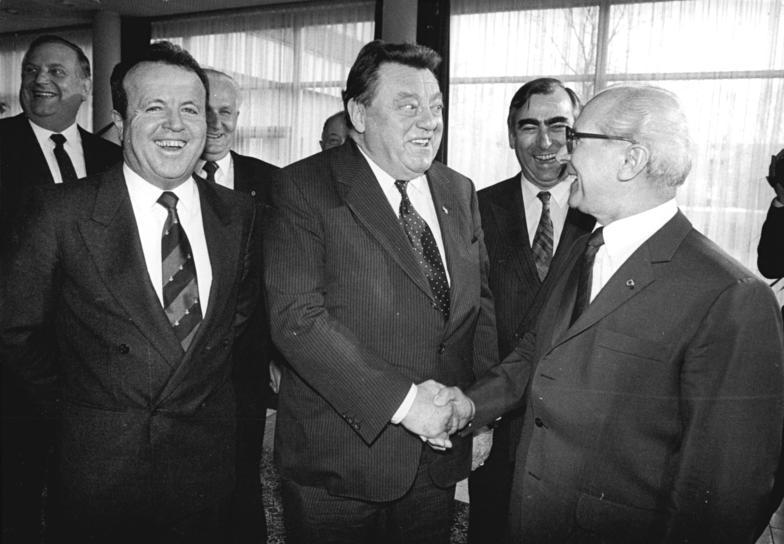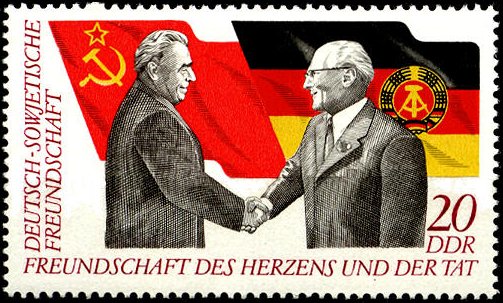18. Januar ’89: “The wall will still be standing in a 50 and 100 years”

Honecker’s prophesy
Erich Honecker was the most powerful politician in the GDR for nearly 20 years. What many people don’t know, even before he became 1st secretary of the Central Commitee of the ruling Socialist Party – SED – he shaped the history of his country. After spending more than two years in Moscow for “educational” purposes he was made security secretary.
The first time he really made a name for himself came when he was responsible for organizing the closing of the border and the subsequent erection of the Berlin Wall in 1961. In that capacity he was instrumental in issuing the so called shooting order. For a long time after the Fall of the Wall it was unclear if such a thing really existed. The only documents they found in the beginning stated something to the effect “in special cases border guards may use their guns to stop people from crossing the border when all other options fail” – thus placing the responsibility for the decision on the individual soldier. Later Honecker was quoted “Against traitors and border violations firearms have to be used”, while his colleague, secretary of Defense and commander of the border guards was filmed saying “If you don’t respect our borders – you will feel the bullet”.
The fact of the matter is; if you were a border guard, every shift started with your CO telling you, that people crossing the border are “vermin”, “enemies of the state”, “fascists” etc. that have to “be stopped at all costs”, “exterminated”, “neutralized”. And if this de-humanizing language is not enough of a give-away of what was expected of you; if you did indeed shoot a refugee, you received special praise, days off and even some extra money as a kind of bounty.
All this makes for a pretty long intro and the shooting order didn’t even survive as long as the Berlin Wall itself, here’s what this post is about in the first place: January 18th 1989 on a symposium of the Thomas Müntzer Commitee – named after a Reformator that was brutally killed in 1525 – Honecker said <the wall> “will still be standing in 50 years and even in a 100 years if the reasons for its existence are not overcome” …. “and this actually neccessary to protect our republic from bandits (literally “robbers”), not to speak of those who are only all to willing to disturb stability and peace in Europe. The protection of its borders is the souvereign right of every state and thus of our GDR as well”.

ADN-ZB Mittelstädt Leipziger Frühjahrsmesse 1987
Begegnung im Gästehaus – von l.n.r.: Alexander Schalck-Golodkowski, Georg [Gerold] Tandler, Günter Mittag, Franz Josef Strauß, Theo Waigel und Erich Honecker.
I was born in West-Berlin in 1974, I never knew an undivided city, and in fact it didn’t feel like it was divided, it just ended at the wall and behind it was something else. As a kid in the west, I didn’t even consider what was on the other side Berlin. Of course I knew that it was only built in 1961, but when I thought of Berlin, I thought of the city I knew – the West. Over the years I talked to a lot of people about that, and in my generation almost everyone felt a bit like that, on both sides of the wall. I couldn’t even imagine a city without this bulwark, much less leaving the city without standing in a traffic jam at the border.
Maybe in January ’89 some people were lucid enough to interpret the sign of the times and had an inkling of what was to come, but basically we were all surprised by the dynamics of the months that followed. So, not even a year after promising us a 100-year-wall it was gone, almost without a trace and another year on, the country that built it, disappeared from the maps as well.

Das Orakel von Ost-Berlin
Erich Honecker, bis zu seiner Absetzung Ende 1989 mächtigster Mann in der DDR, hat schon lange vor der Übernahme des Postens des Generalsekretärs des ZK (Zentralkomitee) der SED wesentlichen Einfluss auf das Geschehen hinter dem Eisernen Vorhang genommen. Insbesondere bei der Ausgestaltung desselben. Kurz nachdem Honecker 1957 aus Moskau zurückkehrte, wo er sich zu Schulungszwecken aufhielt, wurde er zum Sicherheitssekretär ernannt.
Er war maßgeblich an der Planung der Berliner Mauer beteiligt und hat im Vorfeld auch immer wieder für diese radikale Lösung geworben. Nachdem in den ersten Tagen nach der Grenzschließung klar wurde, dass sich Fluchtwillige nicht durch Zäune und Zurufen allein würden aufhalten lassen, erging der Schießbefehl an der Berliner Mauer. Die Diskussionen ob es den Befehl tatsächlich gab, zogen sich nach der Wende etliche Jahre hin. Weil man zunächst nur Schriftstücke fand, die bewusst vage formuliert waren, so dass die Verantwortlichen sich herausreden konnten mit dem Hinweis, es handele sich um eine “Kann”-Bestimmung, nicht um einen strikten Befehl.
Aus dem Befehl Nr. 39/60 des DDR Innenminister: „…unter Einhaltung der einschlägigen gesetzlichen Bestimmungen von der Schußwaffe Gebrauch gemacht werden […] Bei der Festnahme von Spionen, Saboteuren, Provokateuren und anderen Verbrechern, wenn sie der Festnahme bewaffneten Widerstand entgegensetzen oder die Flucht ergreifen und keine Möglichkeit besteht, die Festnahme durch eine andere qualifizierte Maßnahme herbeizuführen.“ In Kombination mit der morgendlichen Vergatterung der Grenztruppen durch die diensthabenden Offiziere, der dabei verwendeten Sprache (“Abschaum”, “Verräter”, “Ungeziefer”, “Feinde des Volkes”, die “vernichtet” oder “ausgerottet” werden) und der Tatsache, dass besonders treffsichere Schützen Belobigungen inklusive Sonderzahlungen erhalten haben, war dennoch allen Beteiligten klar, was von ihnen erwartet wurde. Als Grenzsoldat mit Restmoral blieb eigentlich nur das gezielte Danebenschießen.
All das zur Einleitung, quasi als Foto-Tapete vor der sich Honecker mit seiner Aussage vom 18. Januar 1989 postierte. Im Rahmen einer Tagung des Thomas-Müntzer Komitee – benannt nach einem 1525 ermordeten Reformator – wandte sich der Sekretär mit folgenden Worten an seine Komitee-Kollegen: <die Mauer wird> “in 50 und auch in 100 Jahren noch bestehen, wenn die dazu vorhandenen Gründe nicht beseitigt sind.” Weiter: „Das ist schon erforderlich, um unsere Republik vor Räubern zu schützen, ganz zu schweigen vor denen, die gern bereit sind, Stabilität und Frieden in Europa zu stören. Die Sicherung der Grenze ist das souveräne Recht eines jeden Staates, und so auch unserer DDR.”
Das Seltsame an dieser Aussage ist nicht, dass ein geriatrischer Führer eines ideologisch geführten, autoritären Staates, den Fortbestand dieses Staates für kommende Generationen prophezeit, sondern das wir alle es geglaubt haben. Keine 10 Monate vor dem Ende der Mauer, keine zwei Jahre vor Ende des Staates, den sie schützen sollte, sagt Honecker, dass alles gibt es in 100 Jahren noch und niemand lacht. Wir schüttelten vielleicht mal bedauernd den Kopf und dachten “Ja klar steht die Mauer in 100 Jahren noch”. Warum auch nicht?
Ich bin 1974 geboren und kannte gar nix anderes. Trotz des Wissens um die Geschichte war Berlin für mich an der Mauer schlicht zu Ende, auch wenn das Dahinter auch Berlin hieß. Nach zahlreichen Gesprächen mit Menschen meiner ungefähren Generation aus Ost und West, vermute ich es ging vielen so. Ein Berlin ohne Mauer konnte ich mir nicht nur nicht vorstellen, ich sah überhaupt keinen Anlass das zu tun. Umso dankbarer bin ich denen, denen es anders ging und die für eine Veränderung der Verhältnisse oft genug mehr als nur ihre Karrieren riskiert haben.
